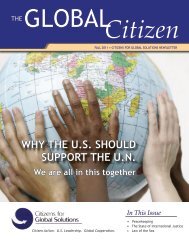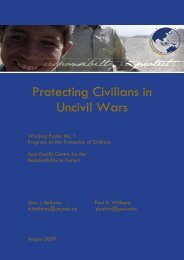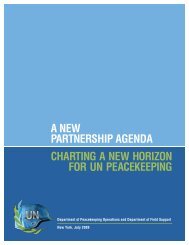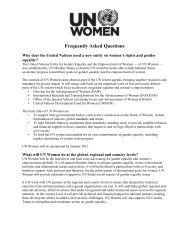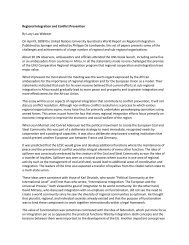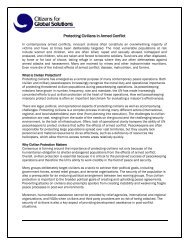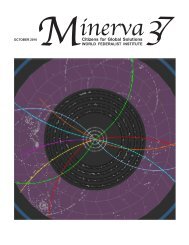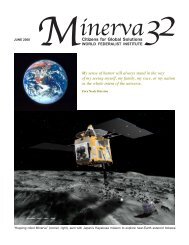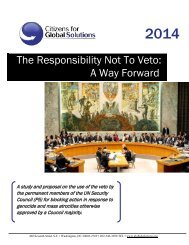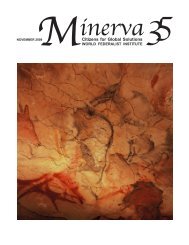Having given the overall thesis, Mc-Clintock turns to the details. The globalthreats not being handled by the currentglobal governance system are “War andConflict”, “Acts of Terrorism”, “NuclearWeapons”, “Depletion of Natural Resources”,“Instability in the Domain ofInternational Finance”, “The Outsourcingof Jobs”, “Migration”, “Indebted Countries”,“The Violation of Human Rights”,“Climate Change”, “The Concentrationof Corporate Power”, and “Pandemics”.McClintock documents each of theseproblems and how the existing globalsystem is not dealing with them. Internationalorganizations exist but they “arenot in a position to make and en<strong>for</strong>celaw” (p. 74). They do not possess sovereignpowers (which is what Hobbes noteda government must have) and they don’thave political legitimacy (which Rousseau& Locke noted that a governmentmust have).In chapter 3 McClintock focuses on theproblem of failing states and asks what isnecessary <strong>for</strong> a state to succeed as a state.The two pre-conditions <strong>for</strong> success are asense of national unity and a benign internationalenvironment (pp. 84-85). Hegives a detailed account of the history ofSierra Leone and a brief reference to Indiain order to substantiate his view. Chapter4 gives a history of the European Union,emphasizing its successes, while chapter5 gives a history of the UN, recognizingits successes but emphasizing its shortcomings.Chapter 6 argues that the EUis a better and more legitimate governingbody than the UN Security Council.Chapter 7, titled “A World of Chronic Anarchy”,marks the culmination of McClintock’sthesis that the basic cause of ourglobal mess is “the fact that the behaviourof states is unregulated” (p. 159).Part II - “What Are the Options?” has onlyone chapter, chapter 8. The options heconsiders & rejects are (1) re<strong>for</strong>ming theSecurity Council, (2) expanding the EuropeanUnion to include all countries, (3)merging existing regional organizations,(4) expanding the G-8 or NATO or TheCommonwealth of Nations or The Non-Aligned Movement or The Conferenceof Democracies to include all nations,(5) getting the United States to becomean enlightened global hegemon, and (8)strengthening the role of internationallaw (p. 172). McClintock then concludes“that if the world is going to avail itself ofa governing body that can be effective, ithas no choice but to create such a body”(p. 186). His specific proposals on howto do that, following the example of theEuropean Union, are set <strong>for</strong>th in Part III(chapters 9-14).Chapter 9 is a general discussion of thenew global organization that would put<strong>for</strong>ward technical solutions that would be“politically acceptable to all the partiesconcerned” (p. 189). The principles to befollowed are gradualism, inclusivity, voluntarymembership, membership availabilityto all nations which could sharesovereignty in the relevant area and dono harm to states outside the community,and all states would be required to gatherinto regions so that the global communitywould have “at most 15 to 25 members— one member <strong>for</strong> every region in theworld” (p. 193). Nations could originallyjoin individually but would have to joinwith other nations in the same region to<strong>for</strong>m a single regional organization. Theglobal community as a whole would have3 institutions (a legislature, a judiciary,and an executive) plus other organs. Itwould seek good relations with all countrieswhich aren’t yet members, but could16 • <strong>Minerva</strong> #39 • November <strong>2011</strong>as a last resort take tough measures suchas suspending trade and cooperation. Inchapter 12 McClintock lays out a food securityplan which might be the first practicalproject <strong>for</strong> the global community. Inchapter 13 he describes a second project,“a community <strong>for</strong> climate, energy, andprosperity” (p. 189).Despite the great contribution this bookmakes to thinking about global governance,it is not without deficiencies. Nomention is made of the role of NGOs orof the International Criminal Court or thelanguage problem facing Europe and theglobal community. Even though McClintockis arguing <strong>for</strong> the need <strong>for</strong> a worldfederation, he says nothing about the argumentsof other well-known advocatesof world federalism such as AlexanderHamilton. From a world federalist pointof view it is surprising that there is nothingabout the difference between a confederationand a federation although thatdistinction is at the very core of McClintock’smain thesis about the need <strong>for</strong> amore effective global organization. ButMcClintock does successfully addresswhat has been a huge issue <strong>for</strong> worldfederalists, namely, how do we begin tomove <strong>for</strong>ward from where we are now?ï“It is often said that the UN is becomingmarginalized in the affairs of a globalizedworld. The global threats to the preservation— even the survival — of organizedlife on the planet demand a much moreeffective global organization than hashitherto been thought necessary. TheUN lives to a considerable extent in apolitical past where independent nationalsovereignty was the gold standard ofinternational affairs. What is needed nowis to reconcile national sovereignty withthe demands of human survival anddecency in the astonishingly dangerousworld we have absentmindedly created.”~ Sir Brian Urquhart, <strong>for</strong>mer UN undersecretary general, “Reinventing the UnitedNations Again?”, UNA-USA WorldBulletin, January <strong>2011</strong>
The following commentary and editorialappeared in the 7 March & 4 April <strong>2011</strong>issues of the New Jersey Law Journal,where Mike Kronisch is a member ofthe Editorial Board. He also is vicechairman of the Center <strong>for</strong> War/PeaceStudies, a nonprofit organization createdto establish an international politicaland legal system devoted to making theabolition of war possible.Reprinted with permission of New JerseyLaw Journal. © <strong>2011</strong> ALM Media Properties,LLC. All rights reserved.Re<strong>for</strong>m of the United NationsSecurity Council & General Assembly —A Step to FederationMyron W. KronischI ~ The Argument <strong>for</strong> Weighted Voting at the UN Security CouncilAs the revolution in Egypt and the unrest in neighboring nations poses great risks andequally important opportunities, one wonders what the United States could do in thisdecade to help advance the rule of law.In his 1984 State of the Union address, President Ronald Reagan asserted, “A nuclearwar cannot be won and must never be fought. ... The only value in our two nations possessingnuclear weapons is to make sure they will never be used. But then, would it notbe better to do away with them entirely?”When President Barack Obama spoke in Prague on April 5, 2009, of an eventual endto nuclear weapons, he addressed the need <strong>for</strong> en<strong>for</strong>ceable international law. He said,“Some countries will break the rules. That’s why we need a structure in place thatensures when any nation does [so] they will face consequences. ... Rules must be binding”(emphasis added). The most logical place <strong>for</strong> that structure is at the United Nations.The Security Council is the United Nations’ most powerful organ. It has five seats <strong>for</strong>permanent members (P5) — the United States, the United Kingdom, France, Russiaand China — and 10, two-year seats. The 1945 charter has given it primary responsibility<strong>for</strong> the maintenance of global peace and security, and its decisions are binding <strong>for</strong>all member states.Meanwhile, UN Secretary-General BanKi-moon has appointed Atul Khare ofIndia, who has served as Assistant Secretary-General<strong>for</strong> UN PeacekeepingOperations among other roles, as head ofthe Change Management Team (CMT)tasked with suggesting re<strong>for</strong>ms including“<strong>for</strong>mulation of a comprehensive plan tostreamline processes, increase accountabilityand improve the effectivenessand efficiency of the organisation in thedelivery of its mandates” (UN statementreported by the Times of India, 1 June<strong>2011</strong>). “The establishment of the CMT isa further step in the ef<strong>for</strong>ts of the Secretary-Generalto strengthen the United Nationsas it is called on to play an increasinglyprominent role in a period of rapidchange and financial constraint and builda management culture focused on excellenceand result.”But the council’s design is out of date: three of the P5 — the United Kingdom, Franceand Russia — are surpassed in economic power by India and Japan. Its limited geographicalbalance, combined with P5’s veto power, however, makes the SecurityCouncil less representative than desired by many member states. No component of theUnited Nations system has been the subject of more ideas <strong>for</strong> re<strong>for</strong>m than the Council.The period 2003–2005 alone witnessed dozens of such proposals.In 2003, Secretary General Kofi Annan flatly told the General Assembly, “I respectfullysuggest to you, Excellencies, that in the eyes of your peoples the difficulty ofreaching agreement does not excuse your failure to do so. If you want the Council’sdecisions to command greater respect, particularly in the developing world, you needto address the issue of its composition with greater urgency.”Professor Emeritus Joseph E. Schwartzberg at the University of Minnesota has draftedthe only plan that would not increase the number of seats. His plan would reduce thenumber to 12; each region would have a weighted vote based on sovereignties, populationand contributions. Called the Universal Regional Representation as a Basis <strong>for</strong>Security Council Re<strong>for</strong>m, it is the only one that gives each of the 192 member-statesdirect or indirect representation on the council: Selection of six of the 12 regional representativeswould take place every year.The paper proposes a universally representative Security Council with 12 “regional”seats: four <strong>for</strong> individual nations (the United States, China, India and Japan) and eight<strong>for</strong> multinational groupings (e.g., Europe, Latin America and the Caribbean). Eachmultinational region would nominate several individual candidates to represent it, andfrom such slates the General Assembly would choose one. [continued, next page]17 • <strong>Minerva</strong> #39 • November <strong>2011</strong>



